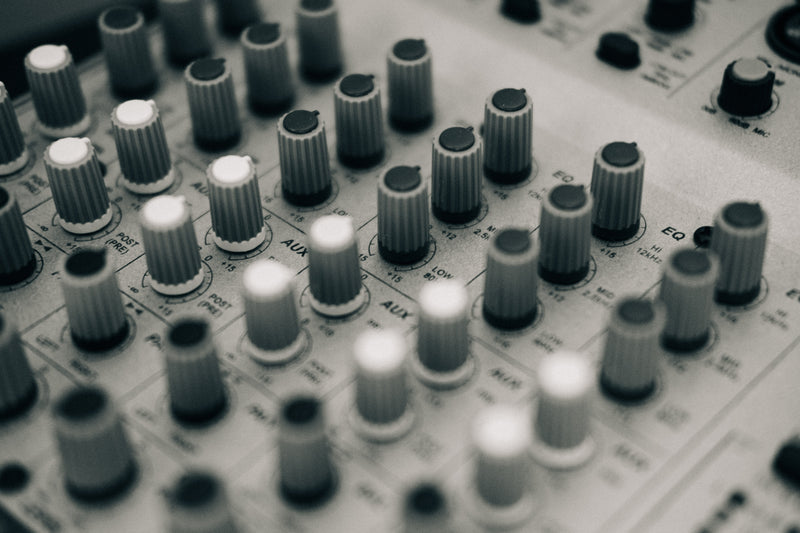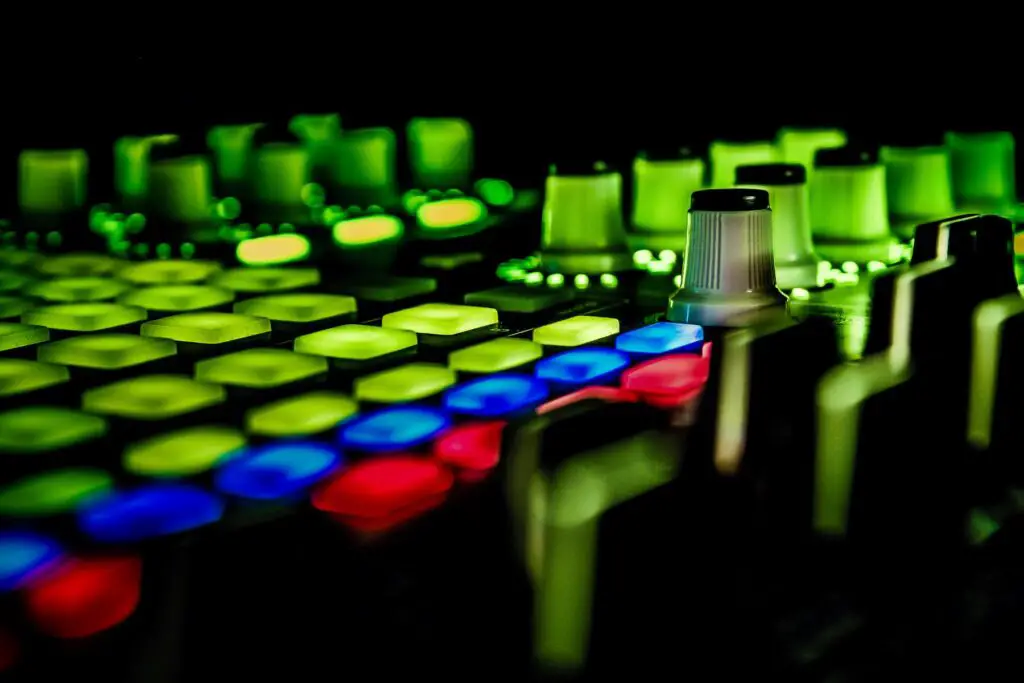When it comes to music production, there are many elements that need to come together to create a truly great track. Two of the most important of these elements are music production and mixing. While both are crucial for making a song sound polished and professional, they require different skill sets and approaches. In this blog post, we’ll be exploring the battle between music production and mixing – which one is more important? Which one requires more skill? And which one ultimately wins out in the end? Join us as we dive into this fascinating topic and discover the answer for yourself.
Table of Contents
Understanding the Differences: Music Production vs Mixing
Music production and mixing are two essential elements in the recording process. Music production refers to the overall creative process of producing a piece of music, from songwriting to arranging and recording different instruments or vocal tracks. On the other hand, mixing is focused on combining all the individual audio tracks into a single stereo track that sounds cohesive, balanced, and polished.
To put it simply, music production is about creating musical ideas while mixing is about making those ideas sound great through technical adjustments. While both aspects are equally important for achieving professional-sounding recordings, they require different skill sets and approaches.
While music producers need to have an ear for melody and creativity to bring their vision to life, mixers should be able to work with various tools like EQs and compressors to polish each element of a track. Understanding these differences can help musicians achieve better results by knowing when they need more focus on either music production or mixing depending on their goals.

The Importance of Music Production in the Recording Process
In the recording process, music production plays a crucial role in shaping the overall sound of a track. It involves everything from songwriting and arranging to recording and editing. A skilled music producer has a keen ear for what sounds good and knows how to bring out the best in each instrument and vocal performance. They also have a deep understanding of music theory, composition, and arrangement.
Without proper music production, even the best mixing engineer will struggle to create a great-sounding track. A poorly produced song will have issues with timing, pitch, and tone that cannot be fixed during mixing. On the other hand, a well-produced track provides a solid foundation for the mixing engineer to work with.
Overall, music production is essential for creating high-quality recordings that stand out from the crowd. It sets the stage for mixing and ensures that each element of the song is captured in its best possible form.

The Art of Mixing: Enhancing the Sound of Your Music
In the world of music recording, mixing is an essential process that helps to enhance the overall sound quality and balance of a track. This involves adjusting various elements such as volume, panning, EQ, compression, reverb and other effects to create a cohesive sound.
A skilled mixing engineer can take raw recordings from different sources (e.g., vocals, guitars, drums) and blend them together into something that sounds polished and professional. They work closely with the producer or artist to make sure that their creative vision is realized in the final product.
One important aspect of mixing is achieving proper levels between all instruments while maintaining focus on the lead instrument(s). A common technique used by mixing engineers for this purpose is referred to as “panning,” where each instrument’s level in speakers are adjusted according to its position in space during production. There’s also “EQ,” which adjusts frequency ranges for each element so they complement rather than cancel out each other.
Overall, good mixing requires experienced ears and attention to detail. It’s not only about making things loud but expertly balancing all elements until they come together cohesively like pieces of a puzzle.

How to Balance Music Production and Mixing for Optimal Results
Understanding the Differences Between Music Production and Mixing
Music production and mixing are two distinct processes that play a crucial role in the creation of high-quality music. Music production involves the creation and arrangement of musical elements such as melody, harmony, rhythm, and lyrics. On the other hand, mixing is the process of balancing and enhancing the sound of individual tracks to create a cohesive and polished final product. While both processes are important, it’s essential to understand their differences to achieve optimal results in your music. By striking a balance between music production and mixing, you can create a well-crafted piece of music that sounds great and resonates with your audience.
The Importance of Balancing Music Production and Mixing in the Creative Process
Finding the right balance between music production and mixing is crucial for achieving optimal results in your recordings. While music production involves composing, arranging, and recording music, mixing focuses on enhancing the overall sound quality by balancing levels, adding effects, and making sure all elements are cohesive.
Both aspects of the creative process play a vital role in producing high-quality music. However, neglecting one in favor of the other can result in an unbalanced final product. Therefore it is important to prioritize both music production and mixing equally to achieve a well-rounded musical composition that is not only masterful but also pleasing to listeners’ ears. Balancing these two processes requires patience, dedication, practice and experimentation until you get a feel for what works best for each individual song or project.
Tips for Achieving Optimal Results in Music Production and Mixing
- Prioritize: Decide which stage to focus on first, depending on your goals.
- Communication is Key: Work closely with the artist/client to ensure their vision is being met throughout the process.
- Use Quality Equipment: Invest in good equipment that will enhance the sound quality of your production and mixing.
- Pay Attention to Details: Small adjustments can make a huge difference in the final product, so don’t overlook any aspect of your work.
- Take Breaks: Resting your ears and brain regularly helps you maintain clarity when working for extended periods of time.
- Trust Your Ears: While technical knowledge is important, it’s also essential to listen critically during both music production and mixing processes.
Remember that both music production and mixing are equally important aspects of creating great-sounding music. By following these tips, you can balance them effectively and achieve optimal results for your clients or personal projects alike!
Finding Your Own Balance Between Music Production and Mixing
Finding your own balance between music production and mixing can be a challenge, but it is crucial for achieving optimal results. It’s important to keep in mind that both aspects are equally vital for creating high-quality music. One key strategy is to establish a clear workflow from the start of your project, which will help you identify when each task should take place. Stay organized and set goals for each phase of the process while keeping music production vs mixing in mind. Another helpful tip is to periodically review your work throughout the process to make sure you’re on track with your objectives, vision, and sound quality goals.

Top Tips for Improving Your Music Production and Mixing Skills
Tips for Improving Your Music Production Skills
- Focus on creating a solid foundation for your music by starting with a clear vision and well-written song. This will make the production process smoother and allow for more creativity in the mixing stage.
- Experiment with different sounds and instruments to add depth and texture to your tracks. Don’t be afraid to try new things and step outside of your comfort zone.
- Learn the basics of music theory to better understand chord progressions, melodies, and harmonies. This will help you create more complex and interesting compositions.
- Use high-quality samples and plugins to enhance the sound of your recordings. Invest in a good microphone, audio interface, and studio monitors for accurate monitoring.
- Collaborate with other musicians and producers to gain new perspectives and learn from their techniques. Attend workshops or online courses to further develop your skills.
Tips for Improving Your Mixing Skills
-
Practice Makes Perfect: The more you practice, the better you will become at mixing. Take some time each day to work on your mixing skills and experiment with different techniques.
-
Use High-Quality Monitors or Headphones: Having good monitors or headphones can make a big difference in how your mixes sound. Invest in a pair of high-quality monitors or headphones that accurately reproduce sound.
-
Learn EQing Techniques: Equalization (EQ) is an important tool when it comes to mixing music. Learn how to use EQ to shape the overall balance of your mix and bring out specific instruments and frequencies.
-
Pay Attention to Levels: Proper gain staging is crucial for achieving a well-balanced mix without distortion or clipping. Practice setting proper levels for individual tracks and buses/auxes.
-
Explore Different Effects Processing Techniques: There are many ways to creatively process sounds using effects like reverb, delay, compression, etc., making it easier to achieve unique sounds in your final mix.
-
Get Familiar with Automation:
Automation can help add dynamics and movement within your track by controlling volume, panning, effects sends/returns on certain sections of the song where needed while helping keep things from getting repetitive throughout the entire song
Choosing the Right Approach: When to Prioritize Music Production vs Mixing
When it comes to prioritizing between music production and mixing, there is no one-size-fits-all answer. It ultimately depends on your goals as an artist or producer. If you’re creating music for personal enjoyment or non-commercial purposes, you may prioritize the creative freedom of the production process over technical perfection in mixing. However, if your goal is to release a professional-quality track, investing more time and effort into mixing can make all the difference.
Consider factors such as your level of expertise in each area and timeline constraints when making this decision. If you have limited experience in either music production or mixing, consider seeking guidance from a mentor or hiring a professional to help fill any gaps in skills and ensure that both aspects are given appropriate attention.
Bottom line: both music production and mixing play crucial roles in bringing your music to life. Understanding how they differ and knowing when to prioritize one over the other can lead to better outcomes for your tracks.
In conclusion, both music production and mixing are crucial components of the recording process. While music production focuses on creating the foundation for a track, mixing enhances its overall sound quality. It’s important to find a balance between the two processes for optimal results.
To improve your skills in these areas, consider investing in high-quality equipment and software tools. Additionally, studying under experienced professionals or attending workshops can provide valuable insights into best practices.
At our website, we offer a variety of articles on music production and mixing techniques that you won’t want to miss out on. Check out our other content today to take your skills as a musician or producer to the next level!


